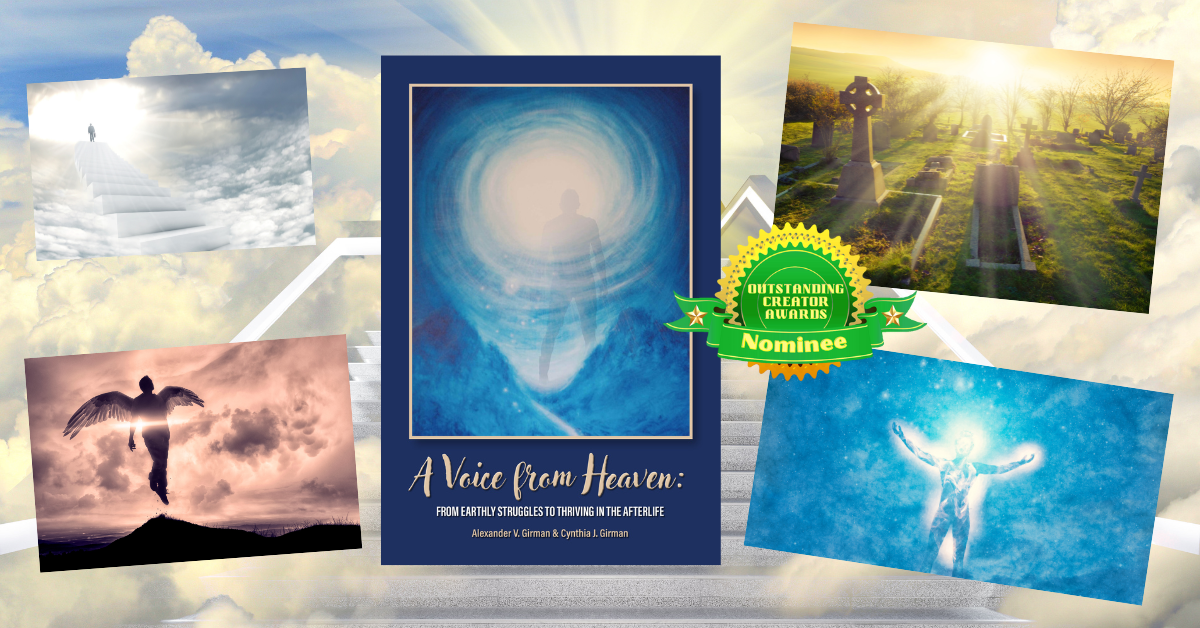|
90/100 (9.0 out of 10)
What happens when we die? Is there an afterlife? Do we have souls? Are we ever truly gone? A Voice from Heaven by Alexander & Cynthia Girman explores some of the mysteries that have haunted the human conscience for centuries. This is really a beautiful and powerful book about coping with and healing from the loss of a loved one—one of the most difficult things many of us will experience in our lives. This book takes the perspective of the narrator, Cynthia, as they take up a Virgil-like role (from Dante's Inferno), interacting with her late son, Alec, in the afterlife. In his life, Alec suffered from Asperger syndrome and attention deficit/hyperactivity disorder (ADHD). Partly as a result of dealing with these disabilities and having access to his grandpa's pain meds, Alec developed a dangerous and ultimately deadly drug addiction. This seems to have escalated as he began mixing drugs and herbs like kratom, the latter of which may have contributed to his eventual overdose. Alec sadly passed away due to this overdose, discovered dead by his mother and father in one of the most heartbreaking scenes in the book. So, this book isn't just about loss or spiritual/metaphysical issues; it also doubles as a book about addiction and the consequences it has for both the addict and their loved ones. Everyone suffers. Nothing goes without consequence. Anyone who has suffered with addiction or who knows someone who has struggled with addiction understands how painful, challenging, and difficult it can be. And let's face it: addiction is, sadly, a more and more common human experience. Some of the best and most emotional parts of this book simply dealt with Alec's life in the earthly plane. It was a lot more grounded and relatable than some of the rest of this book, much of which seems speculative and idealistic. That's not to say that being speculative and idealistic is a bad thing (in fact, it can be a very positive thing depending on the context), however, Alec is the afterlife seems like too different a person to be believable from a reader's/outsider's perspective. Alec in life and Alec in the afterlife are a complete 180 of each other outside of some memory of life and a love for things like chocolate. Although Afterlife-Alec isn't omniscient, his knowledge, wisdom, and understanding seem to have increased exponentially. He speaks with confidence and authority. You can tell throughout the book that Cynthia is the one being taught, enlightened, and educated by her late son, not the other way around. It seems incredibly idealistic and optimistic. It also begs the question: if one person gets to interact with their deceased loved one, why can't everyone? Keep in mind, this is also something we asked about Beloved by Toni Morrison. There is a slight explanation to that question in the book when the narrator discusses seeking the help of a psychic to achieve this purpose. That gets into something that's also a bit odd but interesting: this book's religious perspective is a bit all over the place. A nicer way of putting it: this book's perspective on the afterlife seems to be an amalgamation of different religions. Yes, there are a lot of Christian references in this book—the most obvious being discussions about Jesus' purity and divinity. However, there are also constant Hindu/Buddhist-like references to concepts like reincarnation and enlightenment. Afterlife-Alec says that he has effectively lived many lives, suffering for a distinct reasons and for a distinct purpose—all the while learning how to be more loving, compassionate, and enlightened. According to afterlife-Alec, he continues to exist eternally (and infinitely) without a body. He exists, like similar beings, in a state of “continual bliss.” All the while, his existence crosses multiple dimensions at the same time. This is a result of humans having a “divine soul.” Now, that's actually an interesting theory as to why certain people can see and hear ghosts, especially if these souls are crossing multiple dimensions at the same time (including ours). This book presents one of the most interesting visions of heaven/the afterlife that we've ever read about. The author does a good job at presenting the tastes, sights, and sounds of heaven, using analogies like bells to describe the indescribable. This book can be very heavy-handed, overly idealistic, and speculative at times. Despite all that, this is a really interesting read, especially if the afterlife (or the infinite everlife) is of interest to you. Check it out on Amazon!
0 Comments
Leave a Reply. |
Archives
July 2024
Categories |

 RSS Feed
RSS Feed